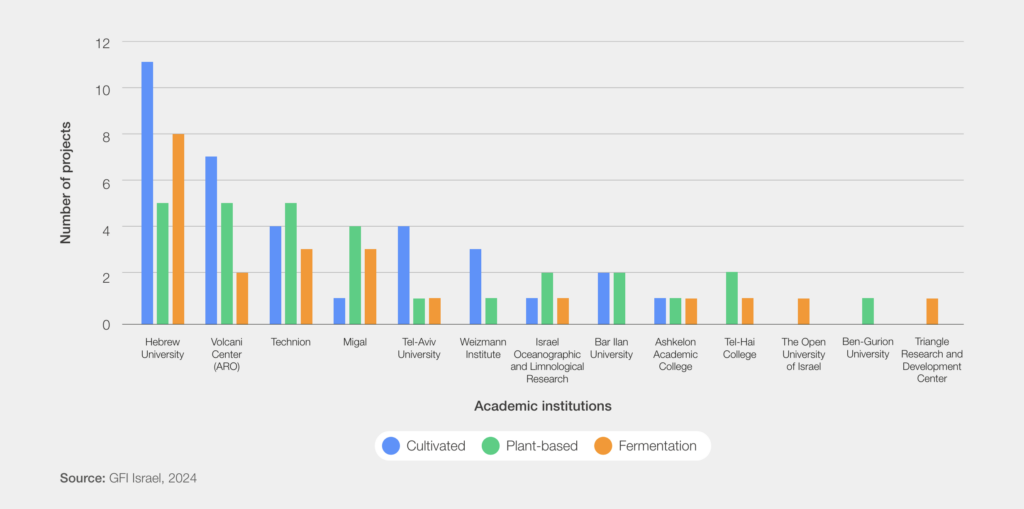In Israel, Alternative Proteins Could Create 10,000 Jobs & Contribute $2.5B by 2030: Report
7 Mins Read
Israel is becoming a major hotspot for alternative proteins, accounting for 10% of the sector’s investments last year, and expected to net $2.5B to the national economy by 2030, according to a new report.
A robust research landscape, strong private and public investment pedigree, exceptional infrastructure and high consumer acceptance – these elements have propelled Israel’s alternative protein sector to new heights, according to a new report outlining the country’s food tech potential.
Published by the Israel Innovation Authority (IIA), the World Economic Forum, and the Fourth Industrial Revolution (C4IR) network led by C4IR Israel and the Good Food Institute (GFI) Israel, the research spotlights a remarkable few years for alternative proteins – home to a record 15 new startups (taking the total to 73), Israel attracted 10% of all VC funding ($1.2B) in the sector from 2014-23, trailing only the US.

But this growth isn’t just a one-off. By 2030, the industry is expected to produce 10,000 additional jobs (a third of which would be manufacturing roles), have more than 200 companies and over a dozen manufacturing facilities, and contribute $2.5B to Israel’s economy through exports, local wages, corporate taxes, and more.
“Alternative proteins emerge as the leading solution to various challenges associated with current meat production methods, including climate change, food security, biodiversity, and antimicrobial resistance,” said Alla Voldman, VP of strategy and policy at GFI Israel. “We believe that ongoing technological innovation and the emergence of startups offering business-to-business solutions to address industry challenges will further accelerate growth.”
Cultivated meat progress

Israel made headlines at the start of the year after becoming just the third country to approve the sale of cultivated meat, greenlighting local startup Aleph Farms’ Black Angus Petit Steak. It highlighted the country’s fast-growing cultivated meat sector and favourable regulatory landscape.
In 2022, the IIA established a research consortium for these proteins, investing $18M over three years and comprising 14 companies and 10 academic laboratories to develop cost-effective methods to produce cultivated meat. Meanwhile, contract development and manufacturing organisations that have traditionally served pharmaceutical companies have now begun to expand to the cultivated meat industry.
Such has been the progress that, in 2022, Israeli startups accounted for a quarter of global private investments in cultivated meat. “Israel has a strong venture capital community in the healthcare sector that deeply understands the science behind cultivated meat and provides essential investment, talent and support to these startups,” said Voldman.
“Israel had an initial advantage with some of the first companies in the field, such as Believer, Aleph Farms, and SuperMeat. These companies benefitted from operating in a country renowned for its excellent infrastructure for entrepreneurship, known as the Startup Nation, and robust research in tissue engineering, biochemistry, biotechnology and relative food sciences.”
Strong focus on research and academia

Over 70 researchers are studying alternative proteins in Israel, 10 of whom began to do so last year. Additionally, there are almost 300 researchers working in adjacent areas like biotechnology, microbiology and pharmaceuticals, whose expertise can benefit the alternative protein industry.
Last year, both the Hebrew University and the Technion (Israel Institute of Technology) announced plans to establish dedicated research centres for food systems and alternative proteins. This is expected to significantly bolster the local research and business environment.
“Alternative protein technologies represent deep-tech advancements driven by multidisciplinary academic research. In Israel, over 50% of startups in this field are rooted in prior academic research, showcasing the depth of academic contributions to industry innovation,” said Voldman.
She added that the country’s commitment to applied research, the knowledge exchange borne out of the physical and social proximity of academia to business and industry, and efforts by the state and organizations like GFI to promote research have been instrumental. “GFI Israel, for instance, proudly participates in funding approximately half of the 70 active researchers in the field in Israel, demonstrating a collaborative approach to advancing academic research in alternative proteins,” she said.
A supportive regulatory and public funding landscape

Food tech – specifically alternative protein – has been recognised by the Israeli government as one of its top five priority R&D areas, thanks to the country’s comparative advantages in certain sectors, its strategic needs, its R&D prowess and position as a global innovation hub, and the sector’s need for government support. A potential national security element, the diversity of human capital and talent development, and the possibilities for cross-sector collaboration were also key criteria.
“The Israeli government has provided substantial support to the alternative proteins sector through a variety of initiatives with the consideration of the value chain of development. Research grants by the Israel Innovation Authority (IIA) and the Ministry of Science, Innovation and Technology, are available for proof-of-concept projects for entrepreneurs, fostering early-stage innovation,” Voldman explained.
Through the IIA, the state is developing a comprehensive approach to investing in businesses at various stages and with multiple stakeholders, according to the report. In 2022, the agriculture ministry and the ministry of innovation, science and tech together with GFI Israel published an open call to fund research grants up to $85,000 per project, totalling $1.2M. This resulted in 15 proposals receiving a grant – and, last year, the initiative was renewed.
The IIA also partially sponsors incubator programmes, with the aforementioned cultivated meat consortium one of the most significant initiatives. Plus, the government has set up a precision fermentation facility to address infrastructure challenges.
“On the regulatory front, a pilot programme for the regulation of alternative proteins is being conducted in collaboration with the ministry of health and the IIA,” said Voldman. “These comprehensive support measures underscore the government’s commitment to advancing the alternative proteins sector.”
Israel’s alt-protein limitations

All the progress isn’t to say that there aren’t any constraints for the industry. There’s a major local supply chain gap, with the relatively small and geographically constrained market obstructing widespread industry adoption. Budget constraints – when compared to economies like the US and China – and the absence of major food and pharma conglomerates represent further limitations.
“Like the global industry, many products have not yet reached the taste and price points that consumers expect. Addressing this challenge necessitates additional investment in academic research and venture creation to develop innovative solutions,” outlined Voldman.
She added: “Scaling up manufacturing for Israeli startups is challenging due to infrastructure costs, mirroring challenges encountered by startups worldwide. Consequently, most new Israeli startups tend to focus more on business-to-business (B2B) solutions, aiming to fill these industry gaps and overcome scalability obstacles.”
The horrifying ongoing conflict in Gaza is a more immediate, much broader challenge. “The geopolitical situation is heartbreaking,” said Voldman. “However, the Israeli entrepreneurs proved their resilience in ensuring their companies meet the milestones. We believe that the increasing need for food security solutions locally and across the globe will drive additional private and public investments in this sector toward innovative technological solutions.”
Recommendations for stakeholders

The report suggests investors can take confidence from the IIA’s initiatives to pump significant capital into the sector, and double down on existing investments. This should encourage VCs to increase their financing in the sector.
When it comes to policymakers, bilateral and multinational alliances – including joint R&D and harmonisation of standards – can be vital in creating a global network of expertise and resources to strengthen local stakeholders. Meanwhile, Israel and other countries could leverage proactive assessments of market failures hurting the private sector to devise strategic solutions collaboratively, which would aid the alternative protein category’s evolution.
And what can food companies learn from this? Large conglomerates should kickstart or further explore collaboration opportunities with alternative protein startups as part of their growth strategies. Partnerships among farmers, pharmaceuticals, and food tech startups are also key to helping scale up the production of these novel foods.
Meanwhile, leveraging agricultural sidestreams like corn, soy, wheat, sugarcane, barley, rice, canola and tomatoes can enhance sustainability and circularity in the food chain, which will optimise resources and boost agricultural resilience.
“Israel possesses unique market characteristics and has emerged as a leader in the consumption of alternative protein products in recent years,” said Voldman. “With a considerable share of vegans, vegetarians, and flexitarians, alongside a population known for early adoption of food innovations, the plant-based market now commands approximately 18% of the milk market and accounts for about 6% of the meat market.”
She added that public interest in developing bioeconomy engines and building a sustainable and resilient food system is on the rise, with alternative proteins recognised as a key tool: “Consequently, alternative proteins are poised to gain increasing support and momentum in the coming years.”



